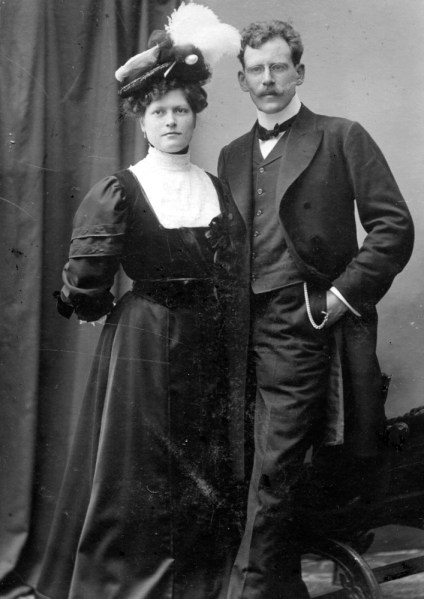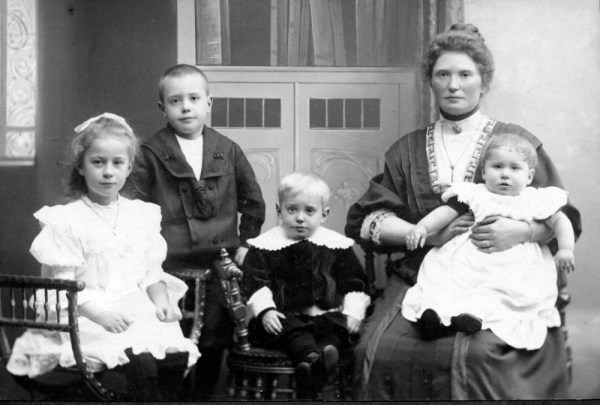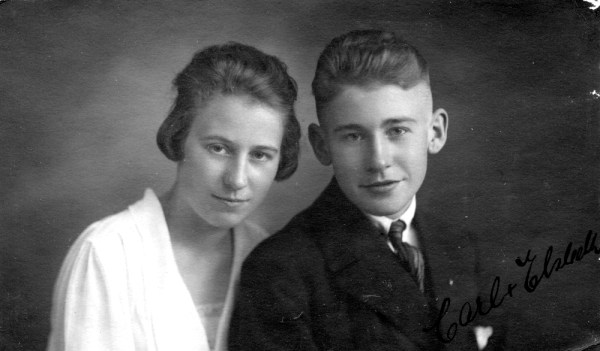
Disaster Strikes the Reifferscheid Family
On the 18th of April, 1901, Mutti was born to Ernst and Elisabeth Reifferscheid (née Krämer) in Burg an der Wupper, a small village south of Wuppertal and Velbert. She was named after her mother, Elisabeth. Her brother Ernst was born in 1903. Then in quick succession followed her brothers Hans and Carl. Three additional children, Margaretha, Anton and Katharina died in their early infancy. When Biene’s grandmother passed away in 1912, most likely from childbed fever at the young age of thirty-six, Mutti was just eleven years old. Her father, who died four years later, could not look after them and placed his orphaned children into the care of relatives and religious institutions. Mutti, motherless and fatherless, spent the next eight years or so in a catholic convent school. She received her education supported by the church and the large, charitable Reifferscheid family, whose guiding principle as devoted members of the Catholic Church can be found in James: True religion is to care for orphans and widows in their afflictions.

As if the tragedy of losing her mother so early in her life and growing up without the nurturing parental love had not caused enough misery, Fate soon dealt her another blow. After she had left the nuns’ protective care that had given her a good foundation in education and matters of Christian faith, she fell in love with a young man. He could – so she was hoping – make up for the lost love she had been missing during her most precious childhood years. Alas, he was of the wrong faith and marrying him in the eyes of her religiously devout relatives would have been unthinkable. While such objections are hard to understand in today’s world, we need to be familiar with the background and origin of such strict opinions. Today, the Catholic Church still claims to be the only true church, but a hundred years ago also enforced strict adherence to the dogma that a parishioner must not marry an unbeliever or a member of a different faith. As Biene and I have experienced ourselves in our struggle of coming together, true love is a powerful force that is willing to break all the rules and conventions. So there was nothing that could stop the two. But Mutti, being an orphan for such a long time, did not want to be cut off from all the family members. They had supported her financially and emotionally until now. The only way to get their approval and remain part of the family was to embark on a most dangerous plan. Mutti and her fiancé decided to force the issue by having a baby. In today’s society, teenage unwed mothers can proudly show off their babies and don’t even hesitate to present them to their classmates and friends in school.

We wonder and ask as to why having a baby would have made such a difference in the opinion of Mutti’s relatives. Without getting judgmental, one must understand the prevailing culture of almost a century ago. Children were and still are considered a gift of God. As soon as they were born, they were baptized into the Christian faith. Godparents were not just there to offer presents and take care of the children when a tragic event would bereave them of their parents. But they were also responsible for providing spiritual nurturing. When the children had grown up, they would get married in a church with the bride’s parents’ consent. At the end of their life’s journey through sorrows and joys, hardships and blessings, successes and failures, wealth and poverty, they departed from the earth with the conviction that there was hope for life beyond the grave. The church in the past proclaimed these views as biblical truths and imposed and enforced them, often regretfully in a dictatorial manner. However, we must not ignore that the believers of those days and still today wholeheartedly sought and embraced the comfort of belonging to the Christian church. A child born out of wedlock would have been a disgrace. Only within the context of the pious Catholic Reifferscheid family’s religious beliefs can we begin to understand Mutti’s and her fiancé’s actions. Aunts and uncles would have readily agreed to the lesser evil of having their precious niece marry a non-member of the church. So, the two so profoundly in love, must have felt. It would most likely have worked if Fate had not decided on a different course and took Mutti’s fiancé away through a fatal accident while she was already pregnant.
So many awful tragedies. Losing both parents so young and living in an orphanage and then being a star-crossed lover whose lover died after she was pregnant with his child—how did she endure? What kind of mother was she herself? What happened to the baby? So many questions yet to be answered.
LikeLiked by 1 person
Amy, I will try to answer all these questions in the posts in the near future. Thank you for your continuing interest and support!
LikeLiked by 1 person
Wonderful photographs to treasure even if there’s sadness.
LikeLiked by 1 person
Thank you, Ruth!
LikeLiked by 1 person
Hello Peter, Thank you for explaining the different societal norms and social pressures of those days so clearly.
LikeLiked by 1 person
I felt compelled to give some background information. How else without it can we understand people’s behaviour such a long time ago?
LikeLiked by 1 person
All the tragedies in Mutti’s life, help explain Biene and her beautiful spirit and kindness. So often life does not go as we planned but good still comes.
LikeLiked by 1 person
Well said! Thank you!
LikeLiked by 1 person
You are welcome!
LikeLiked by 1 person
The 18th of April is a big day in our family, too. My second grandchild was born on that day in 2006, exactly 100 years after the great earthquake and subsequent fire that destroyed most of San Francisco. Fortunately, my newly-wed grandparents survived that day and my father was born four years later! I also remember reading when I was a boy the famous poem by William Wadsworth Longfellow about an 18th century American patriot:
“LISTEN, my children, and you shall hear
Of the midnight ride of Paul Revere,
On the eighteenth of April, in Seventy-five;
Hardly a man is now alive
Who remembers that famous day and year.”
We are also well aware of how the Catholic Church ruled people’s lives a hundred plus years ago. My grandfather’s older brother married outside the Church and his mother never spoke to him again. In fact, the entire family shunned him and my father never knew his cousins who lived close by his grandmother and aunts.
LikeLiked by 1 person
I guess that your story, mine and many others would fill volumes about the suffering people had to endure as a result of church engendered rejection of people who dared to follow the calling of their hearts. Thank you, my dear friend in California!
LikeLiked by 1 person
We were all protestants, so I cannot really relate to a church having so much power over individuals, I only kow that from hearsay.
But the poor girl, losing everyone she ever loved so far and at such young age. She must have been seriouslyl traumatized.
LikeLiked by 1 person
But then fate took a more positive turn and her trauma at least for awhile ended in pure happiness.
LikeLike
That’s good to hear, althouth “at least for awhile” is already sounding like forebodings again …
LikeLiked by 1 person
My goodness, she had more than her share of tragedy and loss! And I do understand how hard it would have been to marry someone of a different faith in those days. My husband was Catholic and I am Protestant, and some of his relatives weren’t happy about our marriage either, and that was in 1980.
LikeLiked by 1 person
It is my impression that the Catholic Church is beginning to recognize that all the other churches share the core of the essential articles of faith and that the time has come for reconciliation.
LikeLiked by 1 person
I think you’re right, and I believe that is a good thing.
LikeLiked by 1 person
Peter, I am so happy to read and get to know about Biene’s family, I kind of always wished for that. It appears that Mutti had been a fighter for what she wanted in life, isn’t that like so similar with what Biene went through with loving you and wanting to get married to you. Can’t wait for ” The to be continued”.
LikeLiked by 1 person
Cornelia, thank you for the heart-warming comment about my wife’s family history! I am especially touched that you remember the story of our love of quite a few years ago. I share all your comments with Biene. Thank you again!
LikeLike
Awe, thank you, that’s so touching to me that you do that. Well I was deeply moved by your both love story.
LikeLiked by 1 person
All diese religiösen Beweggründe machen mich sooo traurig. Aber mehr als das will ich nicht sagen…
Kindessterblichkeit war bei den jeweiligen Großeletern gang und gebe. Der Tod gehörte dazu. Und die, die überlebten, die jeweils ersten Söhne, die fielen im Krieg.
Meine Mutter nannte ihren Erstgeborenen nach den 2 gefallenenen als Doppelname. Dieses Kind, Julius Alois, starb nach einem Viertel Jahr.
Ich weiß nicht, aber ich denke, das war ein harter Schlag, denn Vater und Mutter trauerten wohl auf verschiedene Weise. So nicht nur der Tod bereitete arge Seelenqual.
LikeLiked by 1 person
Der Verlust der Kinder durch Krankheit und Krieg ist das schlimmste Leid, das ihre Eltern verkraften mussten. Vielen Dank für deinen einfühlsamen Kommentar, lieber Gerhard!
LikeLiked by 1 person
It occurred to me that all your family posts offer plenty of material for a historical drama series on television. The screenwriters would only have to write dialogue the characters could plausibly have spoken.
LikeLiked by 2 people
Thank you Steve for the perhaps greatest compliment I have received so far on our family history.
LikeLike
Now you’ll have to see if you can interest someone in the film or television industry.
LikeLiked by 1 person